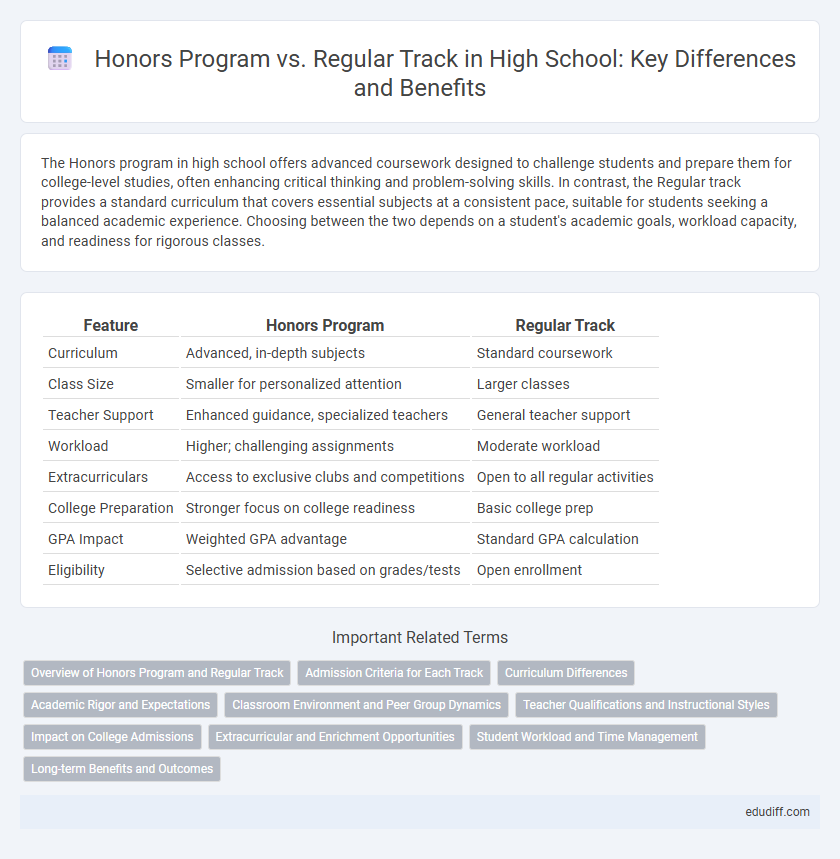The Honors program in high school offers advanced coursework designed to challenge students and prepare them for college-level studies, often enhancing critical thinking and problem-solving skills. In contrast, the Regular track provides a standard curriculum that covers essential subjects at a consistent pace, suitable for students seeking a balanced academic experience. Choosing between the two depends on a student's academic goals, workload capacity, and readiness for rigorous classes.
Table of Comparison
| Feature | Honors Program | Regular Track |
|---|---|---|
| Curriculum | Advanced, in-depth subjects | Standard coursework |
| Class Size | Smaller for personalized attention | Larger classes |
| Teacher Support | Enhanced guidance, specialized teachers | General teacher support |
| Workload | Higher; challenging assignments | Moderate workload |
| Extracurriculars | Access to exclusive clubs and competitions | Open to all regular activities |
| College Preparation | Stronger focus on college readiness | Basic college prep |
| GPA Impact | Weighted GPA advantage | Standard GPA calculation |
| Eligibility | Selective admission based on grades/tests | Open enrollment |
Overview of Honors Program and Regular Track
The Honors Program in high school offers rigorous coursework designed to challenge academically advanced students, often including Advanced Placement (AP) classes and specialized academic projects. The Regular Track provides a standard curriculum that covers foundational subjects and meets state education requirements, focusing on general knowledge and skill development. Students in the Honors Program typically experience a faster-paced learning environment with opportunities for deeper critical thinking and college preparation.
Admission Criteria for Each Track
Admission criteria for the Honors program typically include maintaining a minimum GPA of 3.5 or higher, achieving high standardized test scores, and demonstrating strong recommendations from teachers. The Regular track generally requires a standard GPA around 2.0 to 2.5 and satisfactory performance in core subjects without needing advanced assessment scores. Students aiming for the Honors program often submit personal statements or portfolios to showcase their commitment and academic potential.
Curriculum Differences
The Honors program in high school offers advanced coursework with increased rigor and depth compared to the Regular track, emphasizing critical thinking, analytical skills, and accelerated learning. Honors students engage in specialized classes such as Advanced Placement (AP) or International Baccalaureate (IB) courses, covering complex topics that prepare them for college-level academics. In contrast, the Regular track provides a standard curriculum focusing on fundamental knowledge and general education requirements.
Academic Rigor and Expectations
The Honors program demands a higher level of academic rigor, challenging students with advanced coursework that develops critical thinking and in-depth subject mastery. Expectations include consistent high performance, independent research projects, and active participation in class discussions to foster analytical skills. In contrast, the Regular track offers a standard curriculum designed to meet general education requirements with more flexible grading and fewer specialized assignments.
Classroom Environment and Peer Group Dynamics
Honors programs in high schools often feature smaller class sizes which foster more interactive discussions and hands-on learning, promoting deeper engagement with the curriculum compared to the larger, more structured regular track classes. The peer group dynamics in honors classes tend to be more academically motivated and competitive, encouraging students to challenge themselves and collaborate with similarly driven classmates. In contrast, regular track classrooms offer a more diverse range of academic abilities and social interactions, which can create a broader but less specialized learning environment.
Teacher Qualifications and Instructional Styles
Honors programs typically feature teachers with advanced degrees and specialized training in their subject areas, enhancing the depth and rigor of instruction. Instructional styles in honors classes emphasize critical thinking, analytical skills, and independent learning, often incorporating project-based and discussion-led approaches. In contrast, regular track teachers may have more diverse qualifications, focusing on foundational knowledge with a structured, teacher-led instructional style to support varied learning paces.
Impact on College Admissions
Honors programs often provide rigorous coursework and advanced placement opportunities, significantly enhancing a student's college application by demonstrating academic excellence and commitment. Regular track students may face limited chances to showcase advanced skills, potentially impacting competitiveness in the admissions process. Colleges tend to favor applicants who challenge themselves with honors-level classes due to the proven readiness for collegiate academic demands.
Extracurricular and Enrichment Opportunities
Honors programs in high school offer enhanced extracurricular and enrichment opportunities, including specialized clubs, advanced competitions, and exclusive workshops designed to challenge and engage motivated students. Regular track students typically access broader but less intensive activities, focusing on general skill development and social involvement. Participation in honors-specific programs often correlates with increased college readiness and opportunities for leadership roles.
Student Workload and Time Management
The Honors program in high school demands a heavier student workload, requiring advanced assignments, extensive reading, and rigorous projects that often exceed the regular track's expectations. Effective time management is crucial for Honors students to balance academic challenges with extracurricular activities and personal commitments. In contrast, the regular track offers a more moderate workload, allowing students greater flexibility in managing their study time and reducing stress levels.
Long-term Benefits and Outcomes
Honors programs in high school provide rigorous coursework and advanced critical thinking skills, leading to better college admission prospects and scholarship opportunities. Students in these programs often develop stronger time management and problem-solving abilities, which contribute to higher academic and career success over time. In contrast, the regular track offers standard curriculum but may lack the depth and challenge needed for competitive post-secondary pathways and long-term professional growth.
Honors program vs Regular track Infographic

 edudiff.com
edudiff.com